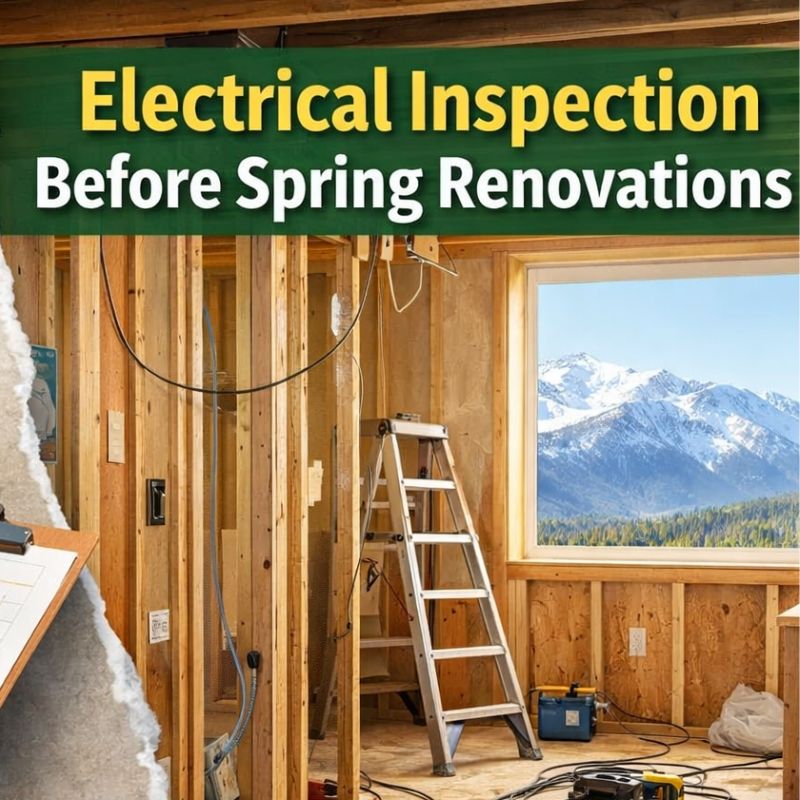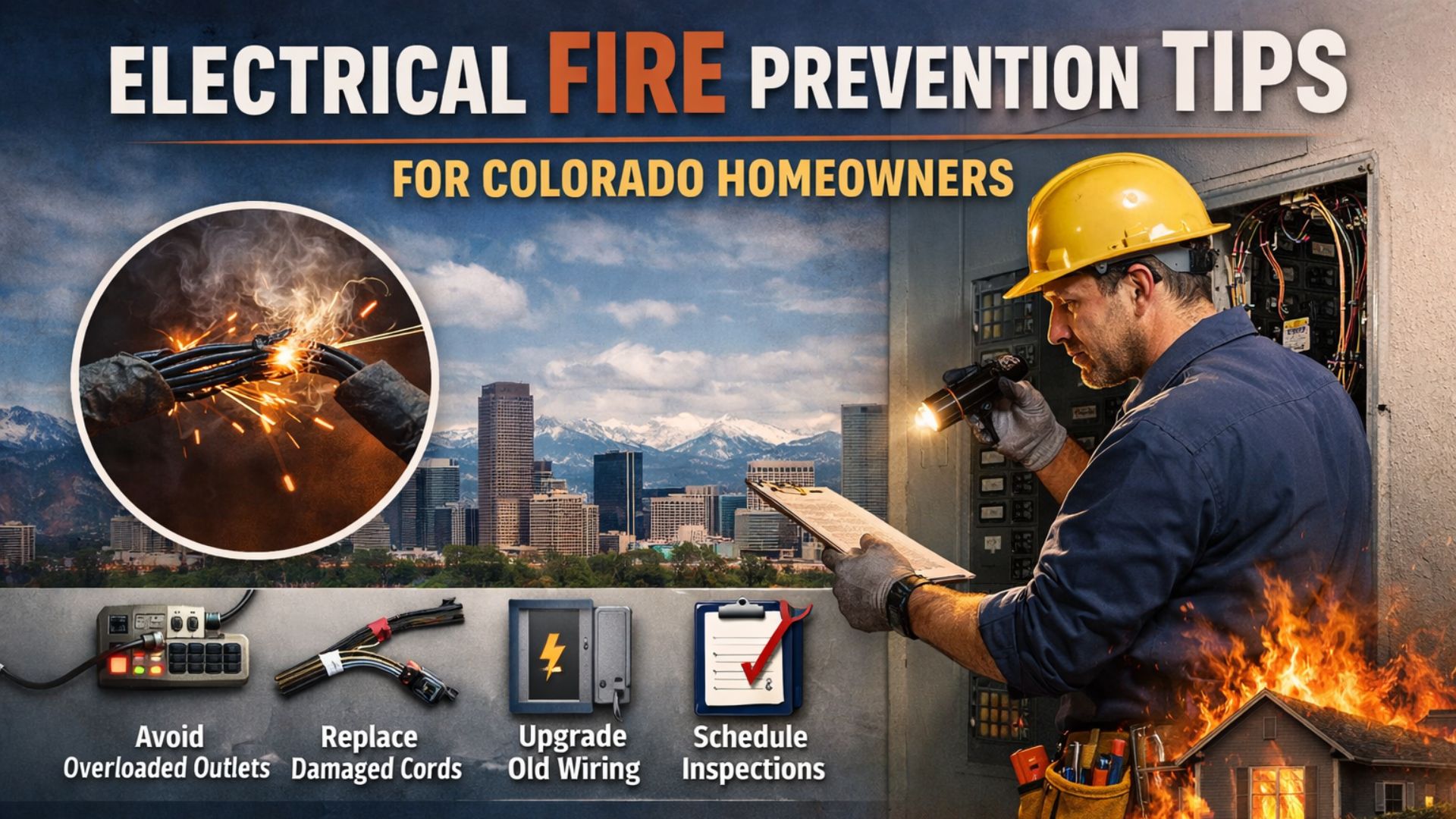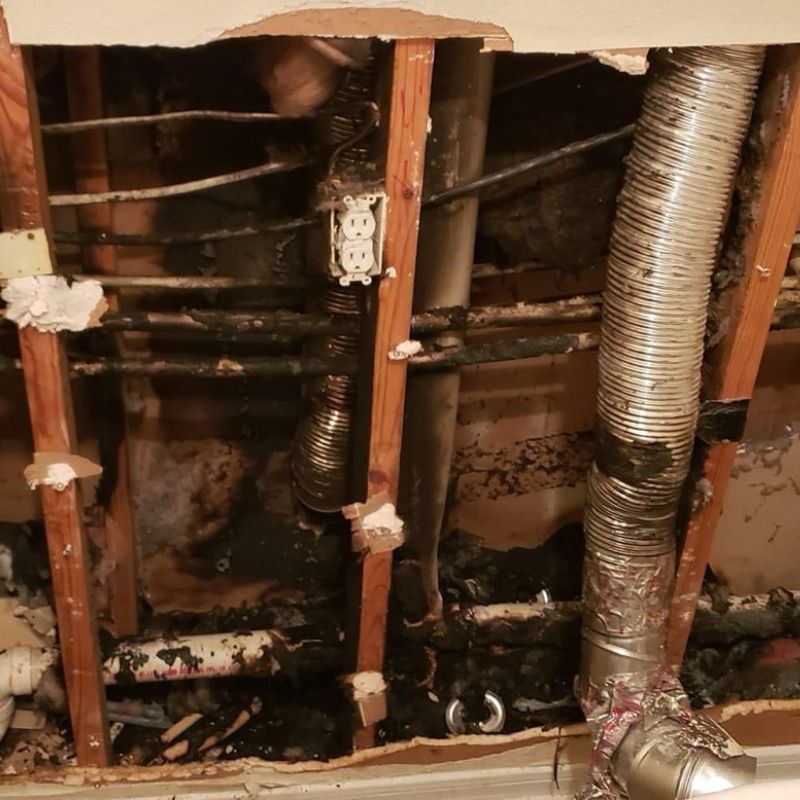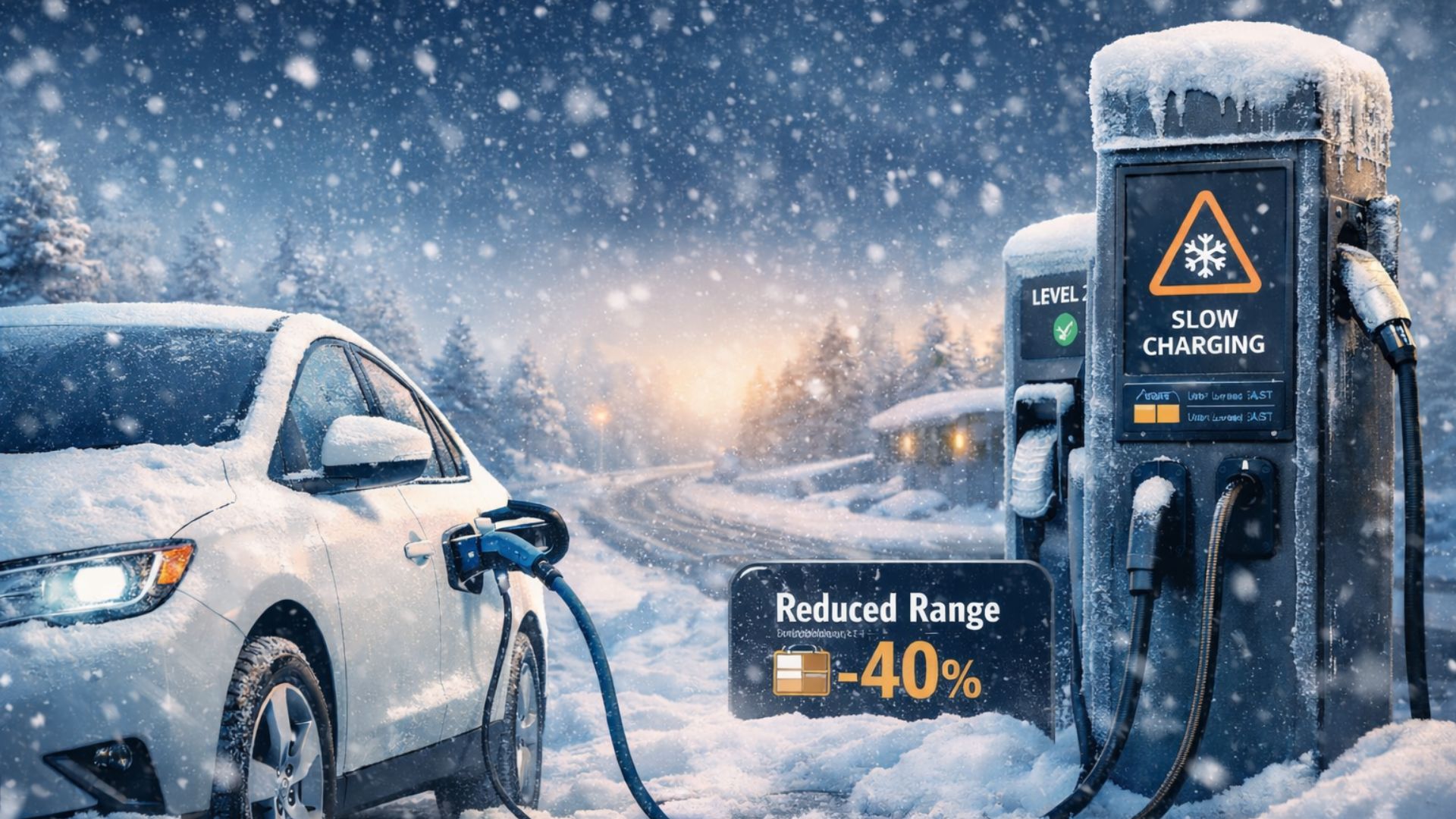Contents
- Preventing Electrical Fires in Winter: Colorado Homeowners’ Guide to Staying Safe and Warm
- Keep Cozy, Not Crispy: How to Prevent Electrical Fires in Winter
- Why Electrical Fires Increase in Winter
- What Is the Number One Cause of House Fires in Winter?
- Can Cold Weather Cause Electrical Fires?
- 5 Tips to Prevent Electrical Fires This Winter
- How Do Electrical Fires Start?
- Electrical Fire Prevention for the Holidays
- Colorado Homeowners: Stay Ahead of Electrical Risks
- FAQs: Electrical Fire Prevention
- Schedule a Free Electrical Safety Estimate
Trusted Colorado Electricians
Preventing Electrical Fires in Winter: Colorado Homeowners’ Guide to Staying Safe and Warm
Keep Cozy, Not Crispy: How to Prevent Electrical Fires in Winter
Winter in Colorado means chilly nights, space heaters, holiday lights, and hot cocoa by the fire. Unfortunately, it’s also the peak season for electrical fires.
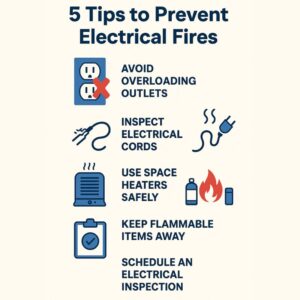
Every year, homeowners across the state experience preventable electrical issues that spark fires, cause damage, and disrupt the comfort of home.
At The Electricians, we’ve seen it all, from overloaded outlets to outdated wiring that couldn’t handle modern energy demands.
The good news?
With a little awareness and proactive care, you can keep your home safe and powered all winter long.
Let’s walk through how to prevent electrical fires, the top causes of winter house fires, and expert-approved tips to protect your home.
Why Electrical Fires Increase in Winter
You’re not imagining it, winter is the riskiest time for electrical house fires. When temperatures drop, energy use surges.
Heaters, electric blankets, space heaters, and festive lights all add extra strain to your home’s electrical system.
Common Winter Fire Triggers:
- Overloaded Circuits: Too many devices plugged into a single circuit or power strip.
- Faulty Wiring: Older homes in Colorado often have outdated wiring not rated for today’s power demands.
- Space Heaters: Portable heaters draw a lot of current and can overheat cords or ignite nearby materials.
- Holiday Decorations: Lights and extension cords can fray or overload outlets.
- Improper Use of Extension Cords: Using indoor cords outside or chaining too many together.
Pro Tip: If your lights flicker when the heater kicks on, that’s not festive, it’s a red flag. Have a licensed electrician inspect your wiring and load balance.
What Is the Number One Cause of House Fires in Winter?
According to the National Fire Protection Association (NFPA), heating equipment is the leading cause of winter house fires. Closely behind?
Electrical malfunctions, especially those involving portable space heaters, outdated wiring, and overloaded circuits.
In short: heat is great when it’s in your furnace, not your wiring.
Can Cold Weather Cause Electrical Fires?
Directly, no—cold weather itself doesn’t cause electrical fires. But indirectly, it sets the stage. The drop in temperature makes people plug in more devices, increasing the load on electrical panels and circuits.
Combine that with dry indoor air (which increases static electricity), and you’ve got a recipe for risk.
So while cold weather won’t start a fire by itself, the habits we develop in winter can.
5 Tips to Prevent Electrical Fires This Winter
If you only take one thing from this article, besides The Electricians’ phone number, let it be these five tips for electrical fire prevention.
1. Don’t Overload Outlets or Power Strips
Each outlet is designed to handle a specific amount of current. Plugging in multiple high-wattage appliances (like space heaters and hair dryers) into the same outlet can overload it.
Tip: Use heavy-duty surge protectors and distribute your devices across circuits.
2. Inspect Cords and Plugs Regularly
Check for frayed wires, cracked insulation, or scorch marks. If you see damage, unplug and replace immediately. Never run cords under rugs or furniture, heat buildup can go unnoticed until it’s too late.
3. Use Space Heaters Safely
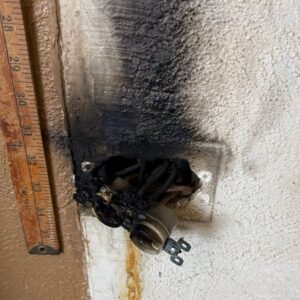
Space heaters should always:
- Be plugged directly into a wall outlet (never an extension cord)
- Stay at least 3 feet away from anything flammable
- Be turned off when unattended
Also, only buy models with automatic shut-off features for extra peace of mind.
4. Upgrade Old Wiring and Panels
Many Colorado homes built before the 1990s weren’t designed for modern electrical loads. If your breakers trip often or lights dim when appliances run, it’s time to upgrade your electrical panel or inspect your wiring.
The Electricians can evaluate your home’s system and recommend smart, safe upgrades that keep your family powered and protected.
5. Schedule a Professional Electrical Safety Inspection
A licensed electrician can identify potential hazards long before they become emergencies.
We recommend annual inspections, especially if:
- Your home is more than 20 years old
- You’ve added major appliances or renovations
- You’re using lots of power strips or space heaters
The Electricians provide thorough electrical safety assessments designed to catch the small issues that lead to big problems later.
How Do Electrical Fires Start?
An electrical fire starts when electricity arcs or overheats, igniting surrounding materials like insulation, carpet, or wood framing.
Common ignition points include:
- Worn-out outlets
- Loose wiring connections
- Overheated cords
- Faulty switches or light fixtures
These fires often start quietly—behind walls or in the attic—making them especially dangerous. That’s why prevention and inspection are key.
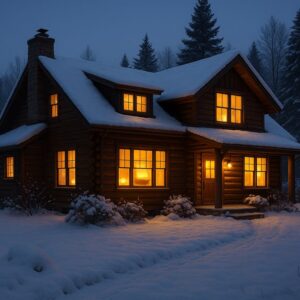
Electrical Fire Prevention for the Holidays
The holidays add even more electrical hazards:
- Overloaded light strands (especially daisy-chained extension cords)
- Old decorations with brittle wires
- Dry Christmas trees near heat sources
Before you deck the halls, check your cords, use LED lights (they run cooler), and unplug decorations before bed. Santa will appreciate the safety upgrade.
Colorado Homeowners: Stay Ahead of Electrical Risks
In Colorado, many homes are older, built before modern energy codes. Add in fluctuating winter temperatures, and your wiring works overtime.
Preventing electrical fires here isn’t just smart, it’s essential.
If you notice:
- Warm outlets or light switches
- Burning smells or buzzing sounds
- Frequent breaker trips
Don’t ignore them. These are your home’s way of saying “help!”
Call The Electricians, Colorado’s trusted pros for electrical safety inspections, panel upgrades, and repairs.
We’ll make sure your home is ready for whatever winter throws at it.
FAQs: Electrical Fire Prevention
What are 5 tips to prevent an electrical fire?
- Don’t overload outlets or power strips
- Inspect cords and plugs for damage
- Use space heaters safely
- Upgrade old wiring and electrical panels
- Schedule regular professional inspections
What is the number one cause of electrical house fires?
Faulty wiring and overloaded circuits are the leading causes, especially in older homes.
What is the number one cause of house fires in winter?
Heating equipment, particularly space heaters, is the top culprit during cold months.
Can cold weather cause electrical fires?
Not directly, but increased electrical use and dry air make fires more likely in winter.
How do you prevent electrical fires?
Avoid overloading circuits, keep cords in good shape, and have your system inspected by a professional electrician like The Electricians.
Schedule a Free Electrical Safety Estimate
Peace of mind starts with prevention. Whether you need a quick inspection, wiring upgrade, or safety evaluation, The Electricians are here to help.
We’ve been keeping Colorado homes safe, powered, and cozy for years—without sparks or surprises.
👉 Schedule Your Free Estimate and protect your home from electrical fires this winter.
Related Posts
If you enjoyed reading this, then please explore our other articles below:
Electrical Panels in Colorado Homes
Many homes across Colorado, especially in Denver, Aurora, Lakewood, and Colorado Springs, were built with electrical panels that were never designed for modern power demands. Cold winters, EV charging, home offices, and newer appliances place added stress on older panels and breakers.
If you are noticing frequent breaker trips, buzzing sounds, or planning an upgrade like an EV charger or heat pump, a licensed Colorado electrician can evaluate whether your panel needs repairs or a full power upgrade.
